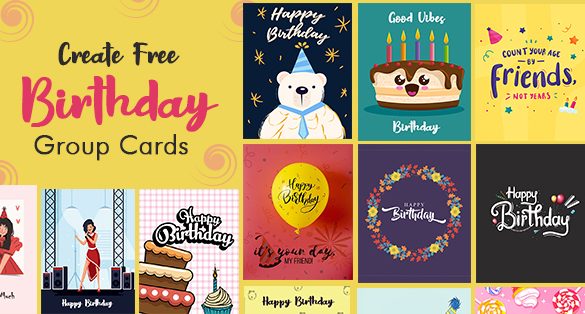Introduction:
In today’s fast-paced digital age, where technology dominates our daily lives and communication often happens through screens, the importance of fostering meaningful social interactions and building strong relationships has become increasingly vital. In this context, group cards, a unique form of interactive communication, have emerged as a powerful tool for enhancing social connections and strengthening relationships.
This article delves into the impact of group cards on social interactions and relationships, exploring their benefits, challenges, and potential for promoting deeper human connections.
Understanding Group Cards:
Group cards are interactive cards designed to be shared among a group of individuals in various social settings. Unlike traditional greeting cards exchanged between two individuals, group cards involve multiple participants who contribute their thoughts, wishes, or sentiments on a single card. These cards often feature a central theme or occasion and are passed from person to person, allowing everyone to add their personal touch.
Enhancing Social Interactions:
- Facilitating Collaboration: Group cards encourage collaboration and participation among individuals. By allowing multiple people to contribute, they create a sense of collective effort and shared experience, fostering a spirit of togetherness.
- Stimulating Conversation: Group cards serve as conversation starters, providing a platform for people to engage in dialogue. As participants read and respond to each other’s messages, they can delve into meaningful discussions, share memories, and strengthen their connections.
- Promoting Inclusivity: Group cards promote inclusivity by involving everyone in the process. Each person’s contribution is valued and appreciated, regardless of their relationship to the card recipient. This can lead to a sense of belonging and strengthen social bonds across diverse groups.
- Fostering Emotional Expression: Group cards offer a unique outlet for emotional expression. Participants can share their heartfelt thoughts, express gratitude, or convey their support collectively, creating a powerful emotional impact on the recipient and reinforcing positive emotions within the group.
Building Stronger Relationships:
- Creating Lasting Memories: Group cards capture a collective narrative, serving as a tangible memento of shared experiences. The act of creating and exchanging these cards strengthens the emotional connection between participants, fostering a sense of nostalgia and shared memories that can be cherished for years to come.
- Deepening Empathy and Understanding: By actively engaging in the creation of group cards, individuals gain insights into each other’s perspectives, values, and emotions. This process promotes empathy, understanding, and acceptance, leading to stronger bonds and more meaningful relationships.
- Strengthening Social Networks: Group cards provide an opportunity to expand social networks. As participants come together to create and share these cards, they connect with new people, build bridges between different social groups, and enhance their overall social support systems.
Challenges and Considerations:
While group cards offer numerous benefits, a few challenges should be considered:
- Logistics: Coordinating the collection of messages and physically passing the card among participants can be challenging, especially in larger groups or when distance is a factor. Digital platforms and online collaboration tools can help overcome these logistical hurdles.
- Communication Imbalance:
In some cases, certain participants may contribute more than others, creating an imbalance in communication. Encouraging equal participation and ensuring that everyone’s contribution is valued is important for maintaining a sense of inclusivity.
- Privacy Concerns:
Group cards involve sharing personal messages within a group. Respecting privacy and ensuring that participants feel comfortable with the level of sharing is crucial. Establishing clear guidelines regarding content and consent can mitigate privacy concerns.
Also Check Farewell Card
Celebrating Milestones and Special Occasions:
Group cards are particularly impactful during milestones and special occasions such as birthdays, weddings, graduations, or retirement parties. They provide a collective platform for friends, family, and colleagues to come together and express their well wishes and support.
Strengthening Professional Relationships:
Group cards are not limited to personal relationships; they can also be used in professional settings. In the workplace, group cards can be a powerful tool for team building, acknowledging achievements, and fostering a sense of camaraderie among colleagues.
Bridging Generational Gaps:
Group cards have the potential to bridge generational gaps by creating opportunities for different age groups to interact and share their perspectives. In multi-generational settings, such as family gatherings or community events, group cards can facilitate intergenerational communication and understanding.
Promoting Creativity and Artistic Expression:
Group cards provide a creative outlet for participants to express themselves artistically. Individuals can decorate the cards, add drawings, or include personalized elements, showcasing their creativity while leaving a lasting impression on the recipient.
Overcoming Communication Barriers:
Group cards can be especially beneficial in situations where language or communication barriers exist. Since participants can express themselves through written messages or drawings, group cards enable individuals who may struggle with verbal communication to contribute and engage in social interactions more comfortably.
Conclusion:
Group cards provide a unique opportunity to enhance social interactions and foster deeper relationships. By encouraging collaboration, stimulating conversation, promoting inclusivity, and facilitating emotional expression, they create a sense of togetherness and shared experiences. By incorporating group cards into our social interactions, we can strengthen our relationships, build lasting memories, and cultivate a more connected and empathetic society.




